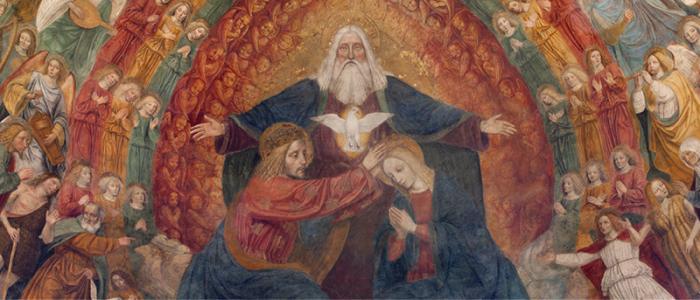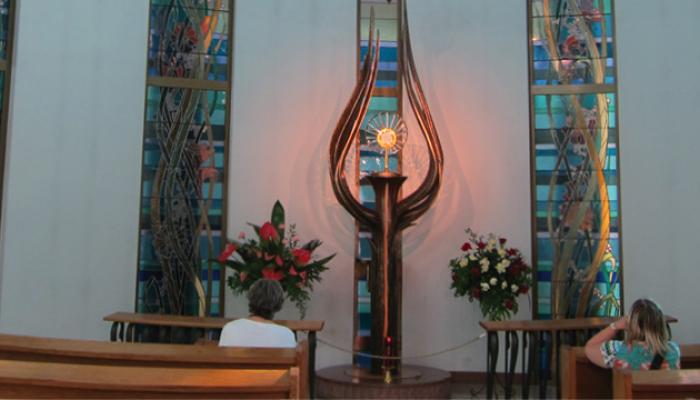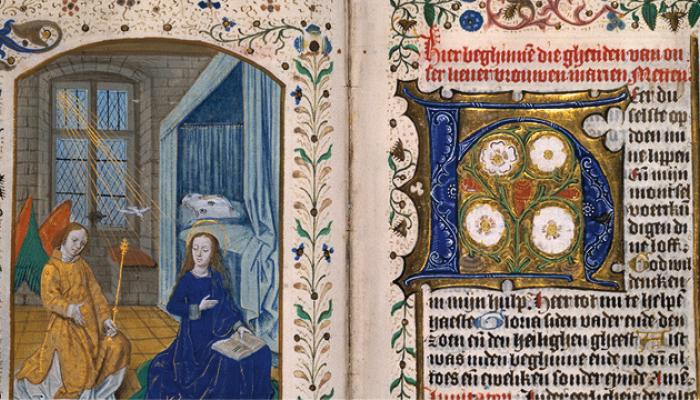
3.9 Do we pray to the Father, the Son, or the Holy Spirit? To Mary and the saints?
We can always pray to each of the three persons of the Trinity, who together form a unity. However, they also have their own, individual personality. We often address our prayers to God the Father: thus we join in the continuous prayer of Jesus to his Father.
We can also pray to Jesus or the Holy Spirit, for example to ask for wisdom and inspiration. Whilst we pray on earth, the saints and angels are praying continuously in heaven. Therefore, you can ask them to pray to God on our behalf, as they are near to him in heaven.
What is the origin of the Our Father?
Jesus taught us this Christian prayer for which there is no substitute, the Our Father, on the day on which one of his disciples saw him praying and asked him, “Lord, teach us to pray” (Luke 11:1). The Church’s liturgical tradition has always used the text of Saint Matthew (6:9-13). [CCCC 578]
Why is it called the “Lord’s Prayer”?
The Our Father is called the “Oratio Dominica”, that is, the Lord’s Prayer because it was taught to us by the Lord Jesus himself. [CCCC 580]
Why do we say “our” Father?
“Our” expresses a totally new relationship with God. When we pray to the Father, we adore and glorify him with the Son and the Holy Spirit. In Christ we are “his” people and he is “our” God now and for eternity. In fact, we also say “our” Father because the Church of Christ is the communion of a multitude of brothers and sisters who have but “one heart and mind” (Acts 4:32). [CCCC 584]
What does the Church ask for when she prays “Thy Kingdom come”?
The Church prays for the final coming of the Kingdom of God through Christ’s return in glory. The Church prays also that the Kingdom of God increase from now on through people’s sanctification in the Spirit and through their commitment to the service of justice and peace in keeping with the Beatitudes. This petition is the cry of the Spirit and the Bride: “Come, Lord Jesus” (Revelation 22:20). [CCCC 590]
Why pray “Thy will be done on earth as it is in heaven”?
The will of the Father is that “all men be saved” (1 Timothy 2:4). For this Jesus came: to perfectly fulfill the saving will of his Father. We pray God our Father to unite our will to that of his Son after the example of the Blessed Virgin Mary and the saints. We ask that this loving plan be fully realized on earth as it is already in heaven. It is through prayer that we can discern “what is the will of God” (Romans 12:2) and have the “steadfastness to do it” (Hebrews 10:36). [CCCC 591]
What does “Lead us not into temptation” mean?
We ask God our Father not to leave us alone and in the power of temptation. We ask the Holy Spirit to help us know how to discern, on the one hand, between a trial that makes us grow in goodness and a temptation that leads to sin and death and, on the other hand, between being tempted and consenting to temptation. This petition unites us to Jesus who overcame temptation by his prayer. It requests the grace of vigilance and of final perseverance. [CCCC 596]
Can we be sure that our prayers are heard?
Our prayers, which we offer in Jesus’ name, go to the place where Jesus’ prayers also went: to the heart of our heavenly Father.
We can be sure of this if we trust Jesus. For Jesus has opened again for us the way to heaven, which had been barred by sin. Since Jesus is the way to God, Christians conclude their prayers with the phrase, “we ask this through Jesus Christ, our Lord.” [Youcat 495]
If the Father is “in heaven”, where is that heaven?
Heaven is wherever God is. The word “heaven” does not designate a place but, rather, indicates God’s presence, which is not bound by space and time.
We should not look for heaven above the clouds. Wherever we turn to God in his glory and to our neighbor in his need; wherever we experience the joys of love; whenever we convert and allow ourselves to be reconciled with God, heaven opens there. “Not that God is where heaven is, but rather heaven is where God is” (Gerhard Ebeling). [Youcat 518]
"What does it mean to say, “Forgive us our trespasses, as we forgive those who trespass against us”?
Merciful forgiveness—the mercy that we show to others and the mercy that we ourselves seek—is indivisible. If we ourselves are not merciful and do not forgive one another, God’s mercy will not reach our hearts.
Many people have a lifelong struggle with their inability to forgive. The deep blockade of being unreconciled is resolved only by looking to God, who adopted us “while we were yet sinners” (Rom 5:8). Because we have a kind Father, forgiveness and reconciliation in life are possible. [Youcat 524]
Blest are you, Mary who believed. Thus we praise you along with Elizabeth (cfr. LK 1:45). Blest are you, Mother of our Lord Jesus and of the Church... To your motherly heart, Mary we especially entrust those who are oppressed by suffering and sorrow: the sick and handicapped, men and women experiencing difficult marriages, the children of families in conflict, men with large debts, the unemployed, the alienated and imprisoned. How many tears, how much fear, how much darkness on this journey! [Pope John Paul II, Prayer to Mary in Mariazell, 13 Sept. 1983]





